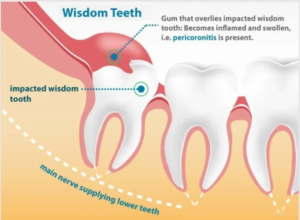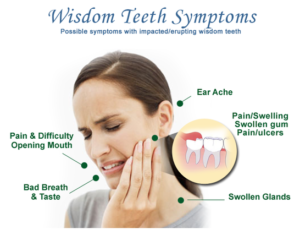
Wisdom teeth are your third molars which are the last teeth that erupt(grow in to the mouth). It is due to the lack of sufficient space for them in the jaw to erupt into alignment with other teeth. Sometimes wisdom teeth erupt in alignment with your other teeth and do not cause any problems. Other times, they become either partially or fully trapped in your gums which is referred to as impaction. Impacted wisdom teeth can cause a variety of problems including food accumulation, cavities, gum infection, etc.

Fully impacted wisdom teeth aren’t visible. They are completely hidden underneath your gums. A partially impacted wisdom tooth is slightly visible because part of it has erupted. Non-impacted wisdom tooth is erupted and is completely visible above the gum line. It’s important to note that non-impacted wisdom teeth can still cause problems.
How common are impacted wisdom teeth?
Impacted wisdom teeth are extremely common. According to the American Academy of Oral and Maxillofacial surgeons, 90% of people have atleast one impacted wisdom tooth.
Symptoms of impacted wisdom teeth:

Symptoms may develop suddenly or gradually over time and include:
- Pain radiating over your jaw, ear, face.
- Swelling over the gums, sometimes face
- Redness over the gums
- Bad taste in the mouth
- Bad breath(Halitosis)
- Pain on opening the mouth and difficulty to open mouth
- Head aches
Sometimes impacted wisdom teeth do not cause any noticeable symptoms.
Causes of impacted wisdom teeth
Wisdom teeth usually become impacted when the jaw is small and teeth are large in size, the jaw doesn’t have enough space to accommodate the teeth. Sometimes a tooth can erupt in an abnormal angulation which can lead to impaction.
Wisdom tooth removal is a common oral surgical procedure that can ease your symptoms and reduce the risk of future oral health problems. Talk with your dentist about whether this treatment is right for you.
BY: DR. MEGHNA REDDY
ORAL & MAXILLOFACIAL SURGEON